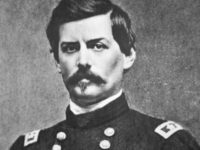George B. McClellan was commander-in-chief of the Potomac Army and the entire Union army during the American Civil War. He distinguished himself as an excellent officer, but often valued his opponents as too strong in the war and dragged on the war by his hesitation.
Origin and teenage years:
George Brinton McClellan was born on December 3, 1826 in Philadelphia, Pennsylvania, the son of a surgeon.
Military service:
Like many other senior officers, McClellan also attended the West Point Military Academy in New York, graduating in 1846 as a Pioneer Officer. In the 2 years of the Mexican-American war, he led some pioneer units.
After the war, he was mainly involved in surveying work, including the Pacific Railroad Surveys in the Washington state in 1853 and 1854.
In 1855 he traveled to Europe to gain experience in the armed forces there and to develop his knowledge. He also worked as an observer during the Crimean War at British headquarters. With his collected experience, he returned to the United States and developed the McClellan saddle for the US cavalry, which was based on the European saddles and until the dissolution of the last cavalry unit in use.
The American Civil War:
With the beginning of the American Civil War McClellan was appointed on April 23, 1861 with the rank of major general back to active duty and assigned to the militia of Ohio. Already on May 14, the occupying army of West Virginia (the area conquered by the Northern States, which split off from the Confederation) was subordinated to him.
After General Irvin McDowell had to defeat his Union troops at the Battle of Bull Run, McClellan was given overall command of the Potomac Army, which carried the brunt of the battles throughout the war.
On November 5, 1861 he was also given the command of the entire Union forces. Here he showed his organizational talent by forming the soldiers into a powerful army. His weakness, however, lay in the use of the soldiers, by often assessing his opponent as too strong and his troops held back to wait for reinforcement. Only under pressure from Washington politicians did he march his army in March 1862 to march on the Confederate capital of Richmond, Virginia. He won some victories during this campaign, but retired from Virginia after the seven-day battle on the Virginia Peninsula, which was undecided.
After the retreat, he was ordered to Annapolis, the capital of the state of Maryland, to build a new army there. With this army, he was able to achieve a tactical draw on September 17, 1862 in the Battle of Antietam against Confederate General Robert E. Lee, which drew Lee back from Maryland. Again, McDowell failed to postpone his troops and confront the weakened forces of the Confederacy. This hesitation deprived him of command of the Potomac Army, where he was replaced by Major General Ambrose E. Burnside.
The political career:
Even during the civil war McDowell left the Union Army and was set up by the Democratic Party in 1864 as a presidential candidate for the upcoming election. McDowell argued that negotiation with the Confederation would put an end to the war, which would have actually led to recognition of the Confederate state. The Southern states, whose commander-in-chief was clear that the war could no longer be won militarily, put their hopes on the election and victory of McDowell. However, after General William T. Sherman and his Union troops conquered Atlanta and a military victory was now foreseeable in the northern states, voter opinion in the north was reversed and Abraham Lincoln prevailed against McDowell in the election.
The End of Life of McDowell:
After the lost presidential election McDowell traveled across Europe and returned in 1868 back to the United States.
Back in the United States, he worked first as chief engineer of the Port Authority of New York and was from 1872 President of the Atlantic and Great Western Railroad.
Since he was still a member and active in the Democratic Party, he was in 1877 set up as a candidate for election to the governor of New Jersey, which he could win. He held office from 1878 to 1881.
George B. McClellan died on October 29, 1885 in Orange, New Jersey.
This post is also available in:
 Deutsch (German)
Deutsch (German)  Français (French)
Français (French)  Italiano (Italian)
Italiano (Italian)  简体中文 (Chinese (Simplified))
简体中文 (Chinese (Simplified))  Русский (Russian)
Русский (Russian)  Español (Spanish)
Español (Spanish)  العربية (Arabic)
العربية (Arabic)












